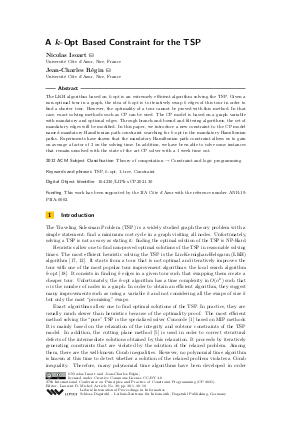A k-Opt Based Constraint for the TSP
Authors Nicolas Isoart, Jean-Charles Régin
-
Part of:
Volume:
27th International Conference on Principles and Practice of Constraint Programming (CP 2021)
Part of: Series: Leibniz International Proceedings in Informatics (LIPIcs)
Part of: Conference: International Conference on Principles and Practice of Constraint Programming (CP) - License:
 Creative Commons Attribution 4.0 International license
Creative Commons Attribution 4.0 International license
- Publication Date: 2021-10-15
File

PDF
LIPIcs.CP.2021.30.pdf
- Filesize: 0.71 MB
- 16 pages
Document Identifiers
Subject Classification
ACM Subject Classification
- Theory of computation → Constraint and logic programming
Keywords
- TSP
- k-opt
- 1-tree
- Constraint
Metrics
- Access Statistics
-
Total Accesses (updated on a weekly basis)
0PDF Downloads0Metadata Views
Abstract
The LKH algorithm based on k-opt is an extremely efficient algorithm solving the TSP. Given a non-optimal tour in a graph, the idea of k-opt is to iteratively swap k edges of this tour in order to find a shorter tour. However, the optimality of a tour cannot be proved with this method. In that case, exact solving methods such as CP can be used. The CP model is based on a graph variable with mandatory and optional edges. Through branch-and-bound and filtering algorithms, the set of mandatory edges will be modified. In this paper, we introduce a new constraint to the CP model named mandatory Hamiltonian path constraint searching for k-opt in the mandatory Hamiltonian paths. Experiments have shown that the mandatory Hamiltonian path constraint allows us to gain on average a factor of 3 on the solving time. In addition, we have been able to solve some instances that remain unsolved with the state of the art CP solver with a 1 week time out.
Cite As Get BibTex
Nicolas Isoart and Jean-Charles Régin. A k-Opt Based Constraint for the TSP. In 27th International Conference on Principles and Practice of Constraint Programming (CP 2021). Leibniz International Proceedings in Informatics (LIPIcs), Volume 210, pp. 30:1-30:16, Schloss Dagstuhl – Leibniz-Zentrum für Informatik (2021)
https://doi.org/10.4230/LIPIcs.CP.2021.30
BibTex
@InProceedings{isoart_et_al:LIPIcs.CP.2021.30,
author = {Isoart, Nicolas and R\'{e}gin, Jean-Charles},
title = {{A k-Opt Based Constraint for the TSP}},
booktitle = {27th International Conference on Principles and Practice of Constraint Programming (CP 2021)},
pages = {30:1--30:16},
series = {Leibniz International Proceedings in Informatics (LIPIcs)},
ISBN = {978-3-95977-211-2},
ISSN = {1868-8969},
year = {2021},
volume = {210},
editor = {Michel, Laurent D.},
publisher = {Schloss Dagstuhl -- Leibniz-Zentrum f{\"u}r Informatik},
address = {Dagstuhl, Germany},
URL = {https://drops.dagstuhl.de/entities/document/10.4230/LIPIcs.CP.2021.30},
URN = {urn:nbn:de:0030-drops-153212},
doi = {10.4230/LIPIcs.CP.2021.30},
annote = {Keywords: TSP, k-opt, 1-tree, Constraint}
}
Author Details
Funding
This work has been supported by the 3IA Côte d’Azur with the reference number ANR-19-P3IA-0002.
References
-
David L Applegate, Robert E Bixby, Vasek Chvatal, and William J Cook. The traveling salesman problem: a computational study. Princeton university press, 2006.

- Pascal Benchimol, Willem-Jan Van Hoeve, Jean-Charles Régin, Louis-Martin Rousseau, and Michel Rueher. Improved filtering for weighted circuit constraints. Constraints, 17(3):205-233, 2012. URL: https://hal.archives-ouvertes.fr/hal-01344070.
-
Jon Jouis Bentley. Fast algorithms for geometric traveling salesman problems. ORSA Journal on computing, 4(4):387-411, 1992.

- Václav Chvátal. Edmonds polytopes and weakly hamiltonian graphs. Math. Program., 5(1):29-40, 1973. URL: https://doi.org/10.1007/BF01580109.
-
George Dantzig, Ray Fulkerson, and Selmer Johnson. Solution of a large-scale traveling-salesman problem. Journal of the operations research society of America, 2(4):393-410, 1954.

- Jack Edmonds. Paths, Trees, and Flowers. Canadian Journal of Mathematics, 17:449–467, 1965. URL: https://doi.org/10.4153/CJM-1965-045-4.
-
Jean-Guillaume Fages, Xavier Lorca, and Louis-Martin Rousseau. The salesman and the tree: the importance of search in CP. Constraints, 21(2):145-162, 2016.

- Martin Grötschel and Manfred Padberg. On the symmetric travelling salesman problem i: Inequalities. Mathematical Programming, 16:265-280, December 1979. URL: https://doi.org/10.1007/BF01582116.
-
Robert Haralick and Gordon Elliott. Increasing Tree Search Efficiency for Constraint Satisfaction Problems. Artificial Intelligence, 14:263-313, January 1979.

-
Michael Held and Richard M. Karp. The traveling-salesman problem and minimum spanning trees. Operations Research, 18(6):1138-1162, 1970.

-
Michael Held and Richard M. Karp. The traveling-salesman problem and minimum spanning trees: Part ii. Mathematical Programming, 1(1):6-25, 1971.

- Keld Helsgaun. An effective implementation of the lin–kernighan traveling salesman heuristic. European Journal of Operational Research, 126(1):106-130, 2000. URL: https://doi.org/10.1016/S0377-2217(99)00284-2.
-
Nicolas Isoart and Jean-Charles Régin. Integration of structural constraints into tsp models. In Thomas Schiex and Simon de Givry, editors, Principles and Practice of Constraint Programming, pages 284-299, Cham, 2019. Springer International Publishing.

-
Nicolas Isoart and Jean-Charles Régin. Adaptive CP-Based Lagrangian Relaxation for TSP Solving. In Emmanuel Hebrard and Nysret Musliu, editors, Integration of Constraint Programming, Artificial Intelligence, and Operations Research, pages 300-316, Cham, 2020. Springer International Publishing.

-
Christophe Lecoutre, Lakhdar Saïs, Sébastien Tabary, and Vincent Vidal. Reasoning from last conflict(s) in constraint programming. Artificial Intelligence, 173(18):1592-1614, 2009.

-
Adam N. Letchford and Andrea Lodi. Polynomial-Time Separation of Simple Comb Inequalities. In William J. Cook and Andreas S. Schulz, editors, Integer Programming and Combinatorial Optimization, pages 93-108, Berlin, Heidelberg, 2002. Springer Berlin Heidelberg.

-
S. Lin and B. Kernighan. An effective heuristic algorithm for the traveling-salesman problem. Oper. Res., 21:498-516, 1973.

-
Shen Lin. Computer solutions of the traveling salesman problem. Bell System Technical Journal, 44:2245-2269, 1965.

-
Ilhan Or. Traveling salesman type combinatorial problems and their relation to the logistics of regional blood banking, 1977.

-
Gerhard Reinelt. TSPLIB - A Traveling Salesman Problem Library. ORSA Journal on Computing, 3(4):376-384, 1991.

-
Robert E. Tarjan. Data Structures and Network Algorithms. CBMS-NSF Regional Conference Series in Applied Mathematics, 1983.

